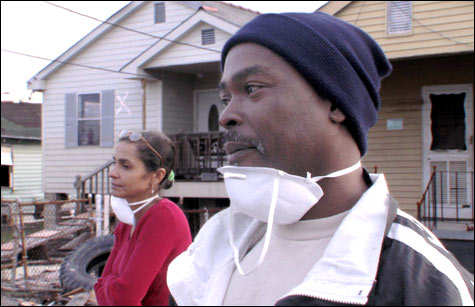
THE AXE IN THE ATTIC A post-Katrina documentary in which the filmmakers transcend their self-indulgences as they delve deeper into the nightmare. |
Some believe democracy can save the world. Others wonder whether it can even work in America. Lately, the process has not looked so good, with an assassination in Pakistan, murder and chaos in Kenya, and Mitt Romney ads in America. This year’s Human Rights Watch Festival at the Museum of Fine Arts examines the success and failure of vox populi in various countries around the world, highlighting issues that Americans might bear in mind when they cast their own ballots.
Here’s a slogan you won’t hear from any candidate in this country: “Support the coca workers!” It works for Evo Morales, whose 2005 campaign for the Bolivian presidency is documented in Alejandro Landres’s COCALERO (2007; January 18 at 6 pm). Morales’s “Movement Toward Socialism” party represents the poor, mostly indigenous farmers of the proscribed leaf (grown, they insist, for legal, non-drug-related purposes), who have been exploited and suppressed by the capitalist establishment and multinational corporations. He at first appears a heroic, affable crusader, but a few sinister traces emerge, such as his ties to Fidel Castro and Hugo Chávez, his jolly slogan “Death to America,” and his inclination to extend the presidency to a lifetime term. Landres, wisely, records and does not comment.
Another marginalized group seek redress at the ballot box in Shimon Dotan’s HOT HOUSE (2006; January 20 at 10:30 am, co-presented by the Boston Jewish Film Festival), which is about Palestinian prisoners in Israeli jails and their participation in the 2006 Palestinian parliamentary elections. Even as they were imprisoned for crimes ranging from terrorist attacks to political activism, some members of Hamas and Fatah used their jail time to earn university degrees and hone their political savvy. Several of them ran as candidates in the election — and won. They almost win my sympathy, too, until, for example, a pretty mother and former TV anchor serving multiple life sentences complacently describes how she abetted a suicide bombing that killed eight children.
Less successful are the efforts of Femi, son of the late, legendary Nigerian musician and activist Fela Anikulapo Kuti, in Dan Ollman’s SUFFERING AND SMILING (2007; January 19 at 4:30 pm). Femi follows the same path as his dad, who in his music relentlessly attacked the corruption and the Western ties of reigning Nigerian despot Olusegun Obasanjo. Beaten by police, his home burned down, Fela persisted till his death, with little to show for his efforts. Femi is similarly frustrated, especially when the people vote Obasanjo back into power. Much of the film is shot while Femi tours Europe, but it neglects to discuss the impact, or lack thereof, of the popularity of his and his father’s music in the same countries he blames for Nigeria’s colonial past and ongoing exploitation.
Some of Africa’s miseries, however, must be regarded as self-inflicted. Bent-Jorgen Perlmutt & Nelson Walker III’s harrowing LUMO (2007; January 19 at 10:30 am) takes as its subject the ongoing civil war in the Democratic Republic of the Congo. The young woman of the title was gang-raped and assaulted by soldiers — and so savagely that she suffered a fistula, a rupture of the wall between the bladder and the vagina. A common complaint, it turns out, in this country. She is one of the lucky ones, as she’s taken to a clinic where she undergoes repeated but unsuccessful surgery. And if she recovers? She will return to her village, where her attackers still operate with impunity.